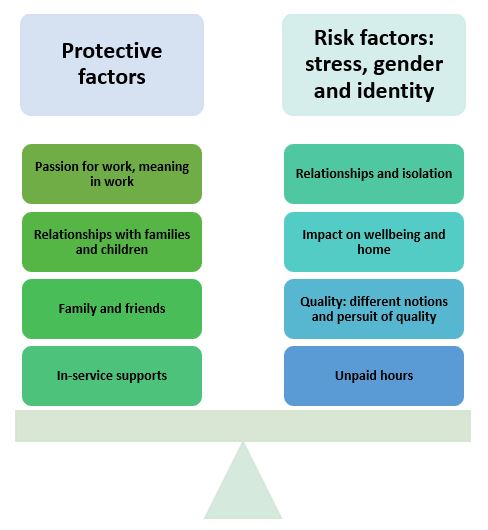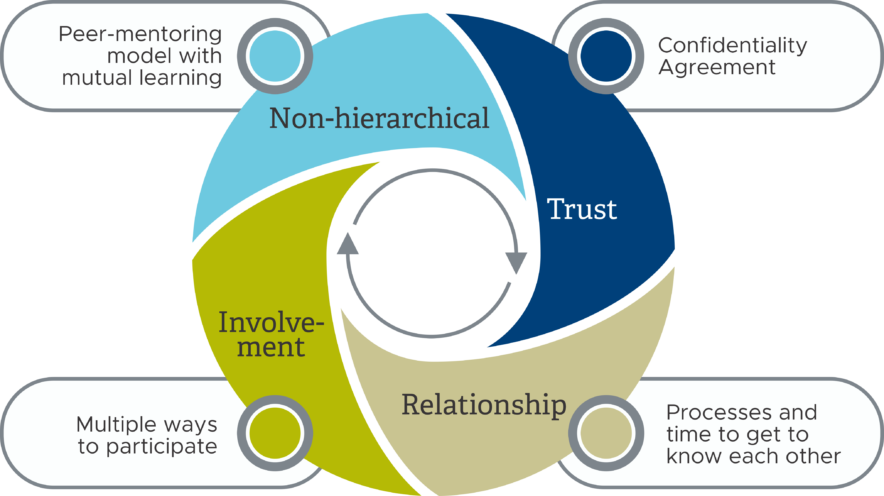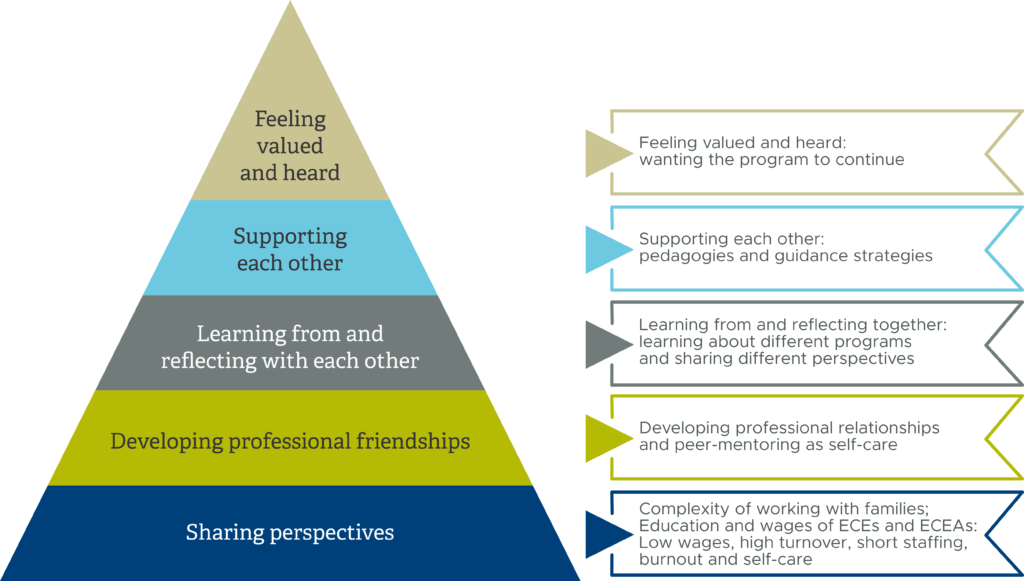Advocacy
Policy
Research
Workforce
The cost of what the Budget doesn’t address will cost us all in the long run

Freya Lucas
Oct 27, 2022
Save
The recent Federal Budget offers a solution to the cost of childcare for families, which will be a welcome relief for many families who are struggling with the cost of living. However, it does not deal with the elephant in the room, the lack of educators.
Whilst some recent state policies are designed to encourage people to study to become early childhood educators (ECEs), the efforts are costly, long term and do not address chronic attrition. In other words, they are using a sieve to bail out the sinking boat. Our 2021 international study revealed the reasons why educators are staying in the sector (protective factors), and why they leave (risk factors). Before the pandemic, there was a delicate balance between the two, but since the pandemic, the risk factors are higher.
Figure 1: The reasons ECEs stay or leave the sector
The educators in the study offered excellent solutions on how the government could better support them to stay. Their ideas offer the Government and agencies insight into ways they could harness and expand those protective factors and supports. The Australian educators said the Government could support them in four ways.
- Reduce their stress and workload
- improve funding to services 'to provide quality’
- Improve ‘educator to child ratios’
- ‘remove the red tape that governs every second of the day within a service’
- Increase their wellbeing, support and professional development
- ‘Provide educators (with) free professional development training’
- Introduce ‘9-day working fortnights and allow for 1 day to participate in self development courses’.
- ‘Ensuring educators can do their jobs and afford to take time off to refresh to avoid burn out’.
- ‘Incorporating educators' well-being/mental health awareness – [I] believe there is a lot of pressure on educators to meet the needs of others resulting in their own health being overlooked. Providing counselling or a middle man (mediator) between the director and educators where educators can go to talk and receive help’.
- Value their work
- ‘Value the work that early education professionals do every day’
- ‘Improve pay’
- ‘Implement salary packaging
- Improve the systems
- 'Stop micromanaging our sector’.
- ‘Promote that meeting the standards is what families and organisations should be achieving and get rid of the standard “exceeding”’.
- ‘Rethink the roles of educators when it comes to paperwork. Almost all paperwork when it comes to working with young children is poorly written because you are 'scattered', leading to a decrease in the quality of the work and our reputation as educators, most adults would struggle to fill in legal paperwork while also supervising children attempting risky climbing, playing games, drinking a bottle, putting small parts in their mouth. Governments need to shift this paperwork toward management and ensure it stays there, too often, management shifts compliance to educators who literally have their hands full and then reprimand them for it (e.g., failure to sign out of a room)’.
- ‘Change the Assessment and Rating (accreditation) process’
- ‘Allow flexibility in delivery. Not all children learn the same way and not all educators deliver a great program in the same way’.
- ‘Make the assessment and rating process more friendly and less like there is someone coming out to the service to find fault in what you do. Maybe have a mentor for each service who can work with them to promote what they do well and help them work on what they need to work on and how to show this during assessment and rating visits.’
- ‘Respect and understand the individualism of each service, and how we guide children’s learning in different ways. There is no "one size fits all" for centres’.
Many educators also commented on the important support piece that colleagues offer and the Australian Early Years Workforce Study Team shared: “We conclude that long term sustainability should attend to appropriate reward of professionalisation. In the short-term supportive workplace culture is critical in retaining and sustaining educators.”
What could we learn from our Canadian friends?
The 2021 study also researched Canadian educators and the work of colleagues in British Columbia who are rolling out evidence-based, peer support programs for educators that are helping with attrition. This program is supported by a mix of government and private funding.
The Peer Mentoring Program for Early Childhood Educators in British Columbia (BC) uses a community of practice (CoP) model, where each educator is valued, respected, and has a voice. The program involves both new and experienced early childhood educators (ECEs) who connect, reflect, and learn from each other through weekly peer mentor and monthly CoP meetings. The program is deliberately set up to be non-hierarchical, recognising that all ECEs have something to contribute.

Educators who took part in the program highlighted that having someone who listens to them, who understands them, and who supports their practice as a fellow early childhood educator was self-care itself and was important for their well-being. One educator shared, “…I was beginning to feel the effects of burnout…I didn’t realise how much I needed another educator to connect with…”
 The structure of the program brought educators together, breaking down barriers, inviting educators to come together with a common purpose and vision. Professional development happens within the peer mentoring CoP, and it is the educators who choose the area of focus.
The structure of the program brought educators together, breaking down barriers, inviting educators to come together with a common purpose and vision. Professional development happens within the peer mentoring CoP, and it is the educators who choose the area of focus. Previous research with ECEs has revealed a “sink or swim” mentality, where educators are left to figure things out on their own. Some educators have experienced workplaces where the needs of children and families are prioritised, while the needs of educators are overlooked or forgotten. There is much focus on children’s early years, and rightly so, but what about educators’ early years?
The Peer Mentoring Program for ECEs in BC aims to expand the infrastructure of support for both new and experienced ECEs, and to reduce the number of educators who leave the field. We aim to build the capacity of early childhood educators, support their ongoing professional identity development needs, as well as increase their levels of educator-efficacy, and their confidence in their own abilities as educators.
The Peer Mentoring Program for ECEs in BC has given us a window into what it would be like if early childhood educators had regular time to meet, within a safe space, where their needs are cared for. What if all Australian ECEs were given time to access professional development, in a similar manner to teachers (in Canada) who receive six full days per year? What if all ECEs had the opportunity to be part of a community of practice, where they met regularly? What if all ECEs had the opportunity to have a peer mentor? What difference would that make? But the Australian Government is tightening its belt
While implementing the educators' ideas and a peer mentoring scheme might cost more, they would:
- reduce attrition, thereby : reduce the cost to attract and train new ECEs, maintain the number of families who have access to early childhood education (addressing the shortage of workers in all sectors)
- improve the well-being of educators, ensuring they can stay longer in the profession
- improve ECE’s ability to support children's learning, reducing the need for further learning supports when the children enter school.
While increases in the wages of educators is important, more is needed. However, a change in one’s pay scale does not mean that the work environment will be more supportive. Put simply, many of the issues facing ECEs will still be present, even if wages are improved. For us, it is not one or the other, it is both. We advocate for both increased wages, as well as increased support for all ECEs.
We join with early childhood educators, and advocate for a reduction of stress and workload, an increase in educator well-being, support, and professional development and a valuing of their work.
Don’t miss a thing
Related Articles



















